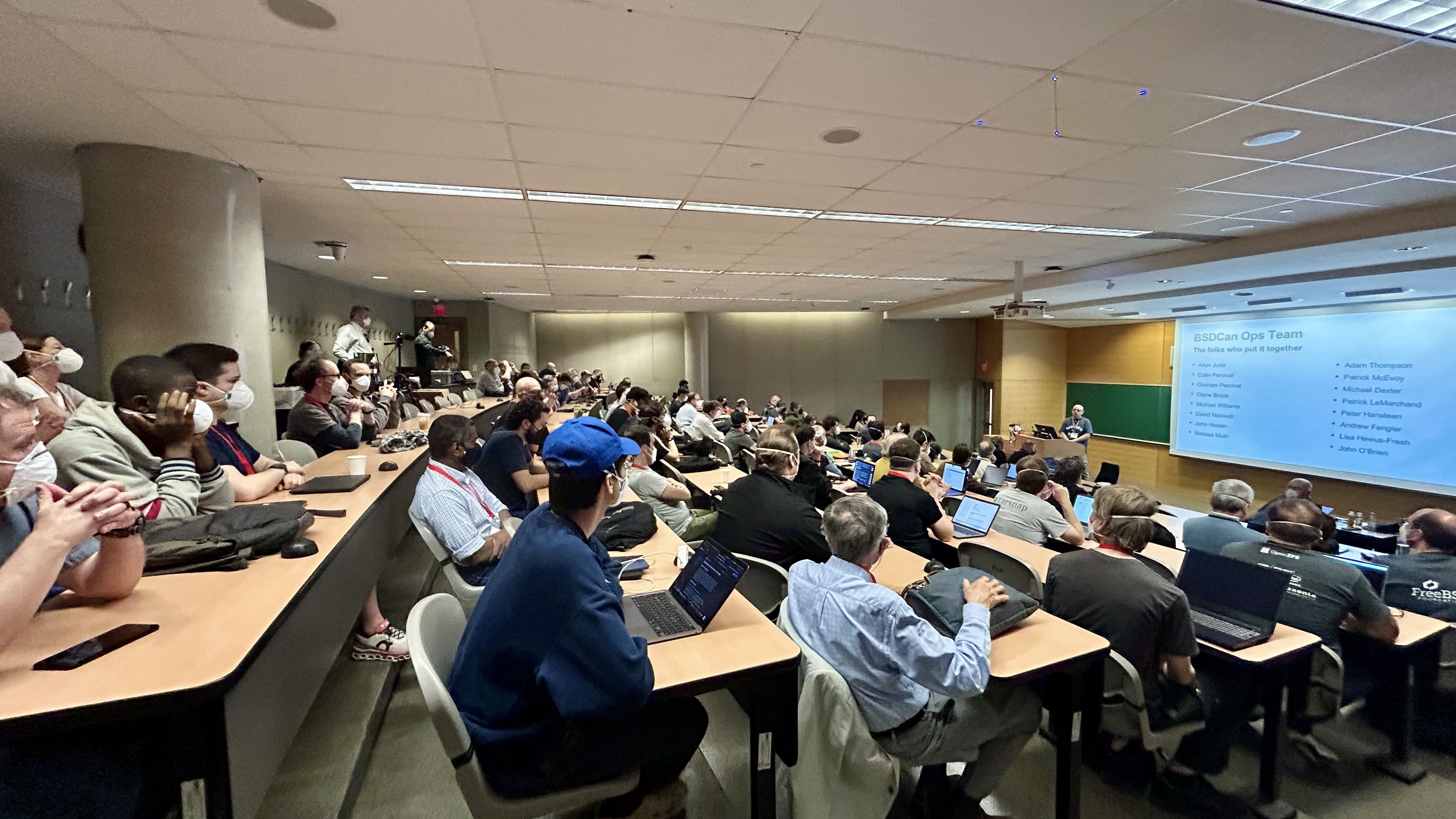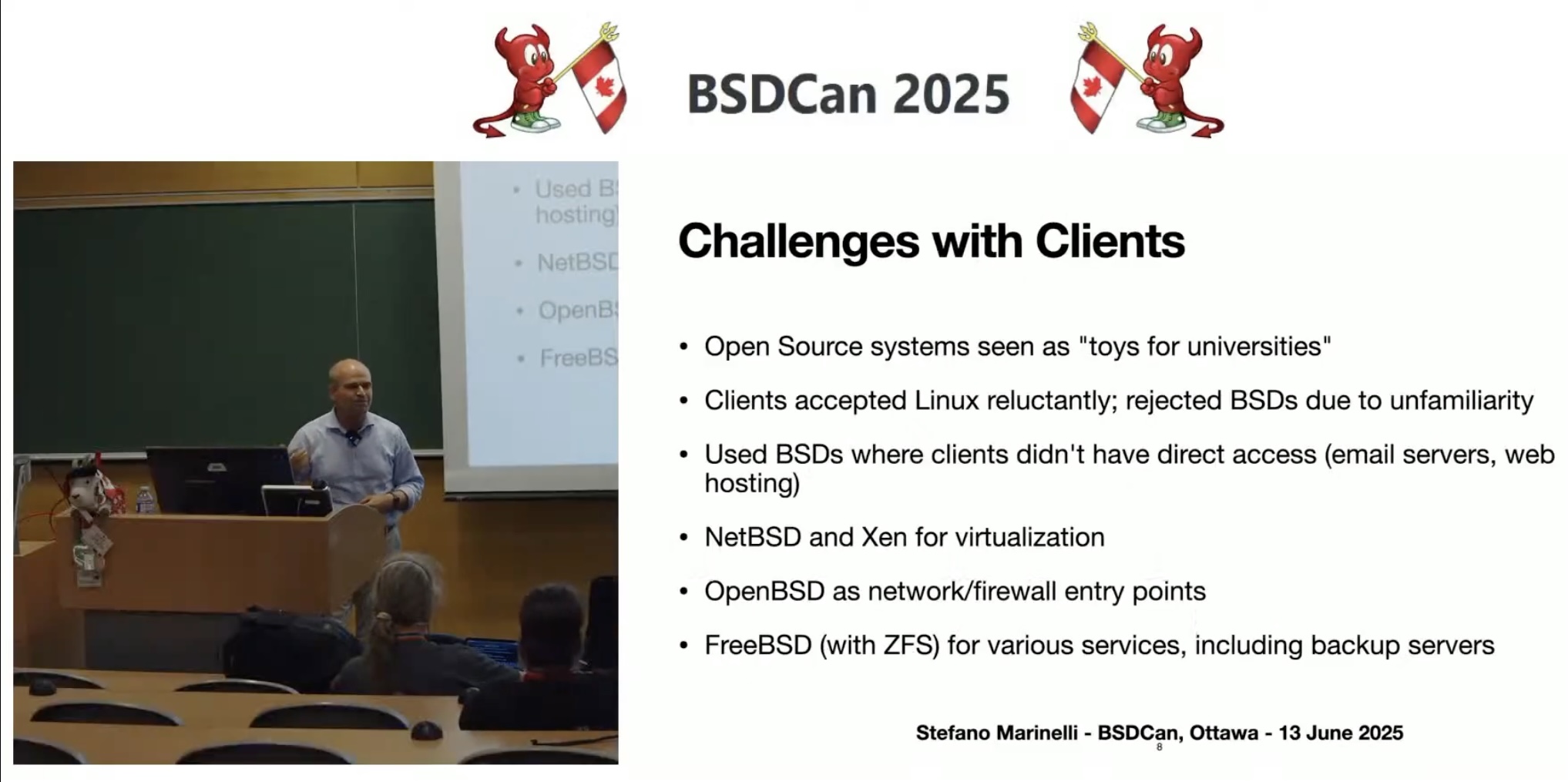A first look at BSDCan 2025

BSDCan is North America's biggest BSD conference. Why is it called BSDCan instead of BSDCon? Well, it's because it's held in Canada, at the University of Ottawa.
Ottawa is a beautiful city. If you ever get a chance to visit, definitely do it! Sure, it was disorienting to drive in a city on a weekday morning without crazy traffic, but it was easy to adjust. The University of Ottawa campus is walkable and comfortable, and it seems a great fit for BSDCan.
There are technical events and there are technical events. Many are for mass consumption, so it can be forgiven if they're not horribly technical. But if you're looking to learn about things in great detail that you knew little or nothing about before, BSDCan is the place for you.
One thing I really appreciate about BSDCan is that the organizers go out of their way to make everyone feel safe and included. They're very clear about their policies: it's a barrier and scent free environment, harassment of any kind is not tolerated, and they require masking so that no one feels unsafe or uncomfortable. It's a refreshing change from the people who act like being asked to be inclusive of others is somehow worse than allowing behavior that might make people uncomfortable or compromise their health.
The talks cover a wide range of topics. I especially enjoy learning about things about which I know little or nothing. Learning more about something that I already know about is fun, sure, but it doesn't challenge me in the same way. At BSDCan, there're always new things to learn, and it's exciting to feel like the least knowledgeable person in the room. The talks are deep, some quite deep, so you get a rare chance to hear about ongoing work on cool projects firsthand and ask questions of the people directly involved.
If you're not into the nitty-gritty of packet filtering, ZFS, or porting, this conference might not be your cup of tea. But if you're someone who loves diving into technical details and exploring rabbit holes, this is the place for you! Imagine having an issue with Alpha assembly and finding someone literally in the same room who can help you out. This doesn't happen in many other places.
Margo Seltzer's keynote talk, "Hardware Support for Memory Hungry Applications" (also "Memory, GPUs, and AI, oh my!"), took us on a journey through enterprise memory usage over time. Does that sound boring? It sounded a little dry, but holy cow, did Margo bring notes! She discussed bad assumptions and misconceptions about memory usage and trends in memory growth, then continued with thoughts about where things are likely to go in the future. While she was giving her talk, every single time I wondered a question in my head, she immediately answered it, and in great detail. It was impressive to see so much covered in such a short amount of time.
YouTube link for Friday, room 1160 (starts at around 36:30).
The next talk I attended, "Why (and how) we're migrating many of our servers from Linux to the BSDs", is by Stefano Marinelli. He talked about the desire to keep things boring - that is, when you're running servers, there's value in systems that Just Work. The BSDs do a very good job of being boring, after all. But when things just work, sometimes users don't appreciate this because things that just work don't demand enough attention to be aware of what they're doing well. Stefano talked about the challenges of educating users about this, particularly in light of how commonly people want to run what they're reading about or hearing about elsewhere, whether it's Linux, Docker, Kubernetes, AI, or whatever. People need to be taught the value of avoiding lock-in and avoiding trend chasing.
Jeff Frasca shared some insights into porting Wayland Compositor to NetBSD and OpenBSD. If you're like me, the word "Wayland" often conjures up imagery of certain enthusiastic open source folks rushing to replace everything old with new things (and new bugs). Wayland is actually a protocol, library, and ecosystem, and a compositor that works with Wayland is what we're talking about here. Familiarity with the politics behind the scenes is helpful when understanding new things, and in this case, understanding the impact the Wayland movement will have to the BSDs is certainly worth learning. Wayland is still in its early stages on NetBSD and OpenBSD, but it's already running and being tested.
Have you heard of TTCN-3? I hadn't, but I love learning, so I attended Hiroki Sato's talk about automated and distributed testing using TTCN-3. When a language is designed for conformance testing (TTCN stands for Testing and Test Control Notation, after all), you know it's going to be technical. I don't know if I'll ever use it, but now I know enough about it to consider it should the need arise.
"Confidential Computing with OpenBSD - The Next Step," by Hans-Jorg Hoxer, goes into great detail about computing in untrusted environments. If you're paranoid like me and refuse to run your VMs on someone else's hardware, you're probably curious about how it might be possible to run VMs that are encrypted so that even a system's hypervisor can't access your VM's memory. Modern processors have built-in features to do this: AMD has SEV, SEV-ES, and SEV-SNP, Intel has TDX, and Arm has CCA, for starters, but your OS has to support them. OpenBSD already supports SEV, with SEV-ES in current and SEV-SNP in active development. Although it might be a few years before this is relevant to me, I learned lots that can't be gleaned from marketing heavy articles on the Internet.

Many of the other talks were filled with information that can't be found with such density and concision anywhere else. Some of the questions that were answered by the talks really can't be answered many other places, so if there's a talk that interests you, or a talk is about something puzzling, check it out! You never know what you might learn.
The whole event was a chance to learn, meet new people, collaborate, and have fun. I got to meet people with whom I've corresponded for decades but never met in person or haven't seen in decades. I met some new developers who aren't even as old as some of my servers! There's an amazing spread of interesting people of all ages, with various interests and backgrounds, from all over the planet. I'm going to do what I can to make BSDCan a regular occurrence.
The BSDCan timetable is here: https://www.bsdcan.org/2025/timetable/timetable.pdf
And here are the talks, sorted by room, as found on the timetable: Link to YouTube BSDCan playlist